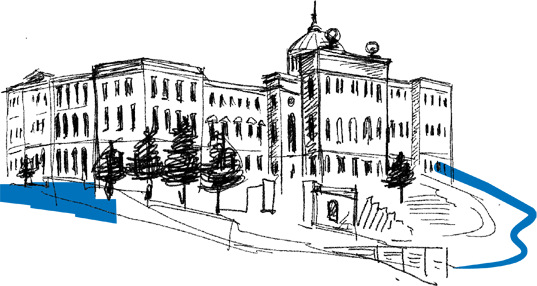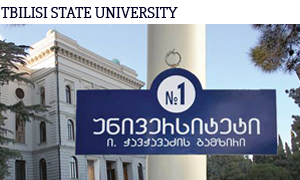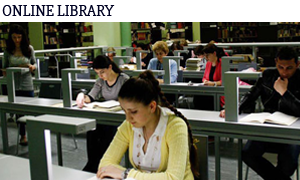
FACULTY OF LAW
The Davit Batonishvili Institute of Law is Established
In January 2012 a new scientific research union, the Davit Batonishvili Institute of Law, was established at the initiative of TSU students, PhDs and Professors, united in the Georgian Society of Young Scientists. Presently the Davit Batonishvili Institute of Law is the most important young researchers union in the South Caucasus with the objective of implementing educational and scientific projects in the field of law.
The Director of the Davit Batonishvili Institute of Law, Dimitri Gegenava, describes why the Institute was needed. “In every country, law and legal sciences are of paramount importance. The state that does not have a high legal culture and scientific tradition is easily influenced by other states. The Soviet past has had a very negative impact on Georgian law, and only a few types of legal issues could be legislated during the Soviet period, but under serious censorship. Other legal issues were merely banned or “studied”. Many European-minded scientists fell victim to Soviet repression during occupation, and as a result, today Georgian legal literature is very poor. This, in turn, has had a bad impact on Georgian legislation, which is also in a terrible state and in vital need for improvement.
 The Director said, “The primary reason for establishing the Davit Batonishvili Institute of Law was to fill these gaps and help develop the Georgian legislative system, while simultaneously popularizing legal science in Georgia. The Institute is made up of professors and scientists of all age groups, and especially by youth. The development of any field is practically impossible without the active involvement of youth to explore and examine current issues. I recall Professor Paata Turava’s statement about the vital need for youth involvement—and this has been my motto for many years: ‘Students and young people should write as much as possible. Maybe this writing is not quality work at the first try, but writing will help them move forward and develop. Students have many more advanced innovative skills than we do, since they have fewer everyday worries on their mind.”
The Director said, “The primary reason for establishing the Davit Batonishvili Institute of Law was to fill these gaps and help develop the Georgian legislative system, while simultaneously popularizing legal science in Georgia. The Institute is made up of professors and scientists of all age groups, and especially by youth. The development of any field is practically impossible without the active involvement of youth to explore and examine current issues. I recall Professor Paata Turava’s statement about the vital need for youth involvement—and this has been my motto for many years: ‘Students and young people should write as much as possible. Maybe this writing is not quality work at the first try, but writing will help them move forward and develop. Students have many more advanced innovative skills than we do, since they have fewer everyday worries on their mind.”
The Davit Batonishvili Institute of Law encompasses national as well as international and comparative law, and research is carried out by young scholars, practicing lawyers and students at the Faculty of Law in fields like administrative law, international law, private law, constitutional law, criminal law, the history of law, the philosophy of law and comparative law.
A Scientific Council makes decisions and defines the major academic directions of the institute. The Head of the Council is the Institute’s Director, and structures include the Scientific Department, Publishing, the Library, a Study and Training Center as well as Organizational and Project Management Services. The Scientific Department is supervised by Sergi Jorbenadze, with 55 collaborators, up to 15 invited scholars and 45 interns. Institute interns include professors, lecturers, PhDs, practicing lawyers, as well as MA and BA students specializing in different academic fields. The Scientific Department includes Private, Administrative, Constitutional, International and Criminal law, a Center of Media Law, Intellectual Property Law and interdisciplinary research projects.
The Institute of Law publishes legal literature including periodicals, textbooks and monographs. Between January 2012 and January 2013, 13 publications appeared, including a law journal Sarchevi. This journal is issued annually as a joint publication of the Institute of Law and the European Law Students Association Georgia. From 2012 it has been a peer-reviewed journal.
Also last year the following publications appeared: Legal Review of Student Self-Government authored by Dimitri Gegenava; The Witness Protection Program by Levan Gvritishvili; Modern Constitutional Law Vol III; Constitutional Justice in Georgia: Major Systemic Problems in Proceedings by Dimitri Gegenava; Standards of Directions and Indications in Law by Dimitri Gegenava and Giorgi Burjanadze; A Glossary of Legal History by Mariam Khoperia; Cases in Constitutional Law by Dimitri Gegenava and Zurab Macharadze; and Goodwill as an Object of Intellectual Property and its Place in Competitive Relations by Gvantsa Gugeshashvili, as well as The Democratic Republic of Georgia and the Constitution of 1921, which includes the first National Conference on constitutional law and a collection of speeches.
In the summer of 2013, the Institute will release two new Georgian journals - the Review of Private Law and the Review of Modern Law. The main priority of 2013-2014 is to create textbooks and supplementary textbooks in law and interdisciplinary fields. Special attention will be paid to the analysis and research of the practice of common and constitutional courts. In addition to these two journals, publications will include Modern Constitutional Law, volume II, a translation of Gustav Radbruch. The others are series of rare publications: Aleksandre Vacheishvili’s Kelsen Doctrine of the Law and State; Giorgi Gvazava’s Key Principles of Constitutional Rights; Giorgi Naneishvili’s Works; and Sergi Japaridze’s Trade Law.
The Institute is carrying out the digitization and re-publishing of rare publications, including Surguladze-Naneishvili Polemics (published); Kelsen Doctrine of the Law and State by Aleksandre Vacheishvili (in preparation) and works by Giorgi Gvazava, Giorgi Naneishvili, Sergi Japaridze, and others.
The Institute encounters challenges but seeks to explore new fields through practical and scientific projects, including several that are popular with the public. Apart from its more scientific work, the Institute of Law is engaged in practical activities such as the Study/Training Center which carries out practical projects with law schools, organizes seminars, conferences, trainings and public lectures. A key ‘brand’ of the Institute is the Certificate Program in Academic Legal Writing and seminars in solving cases. This is the first time that scientific studies have been published in Georgian on formerly unexplored, unstudied issues. The Davit Batonishvili Institute of Law cooperates with various Georgian universities and research centers, and has links and partnerships with international organizations, for example working with the European Law Students Association Georgia on joint publications and projects.




